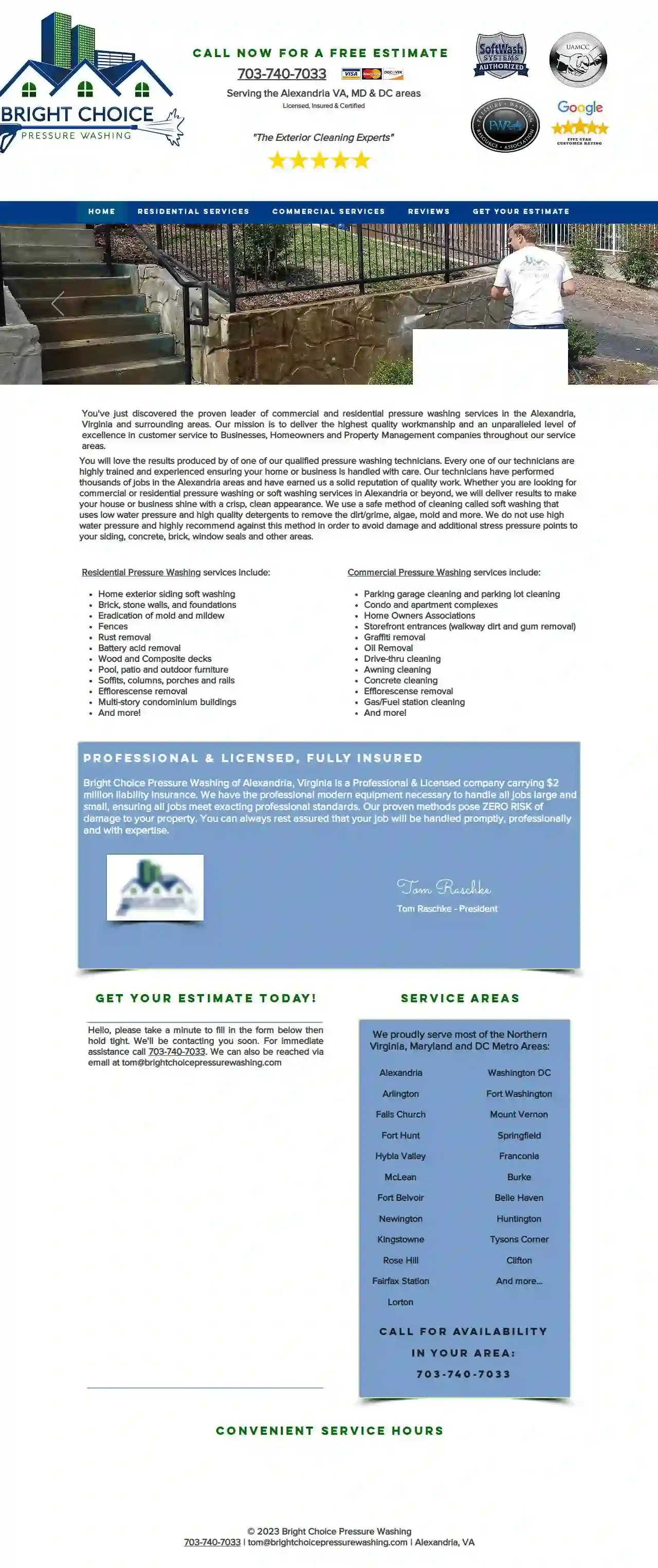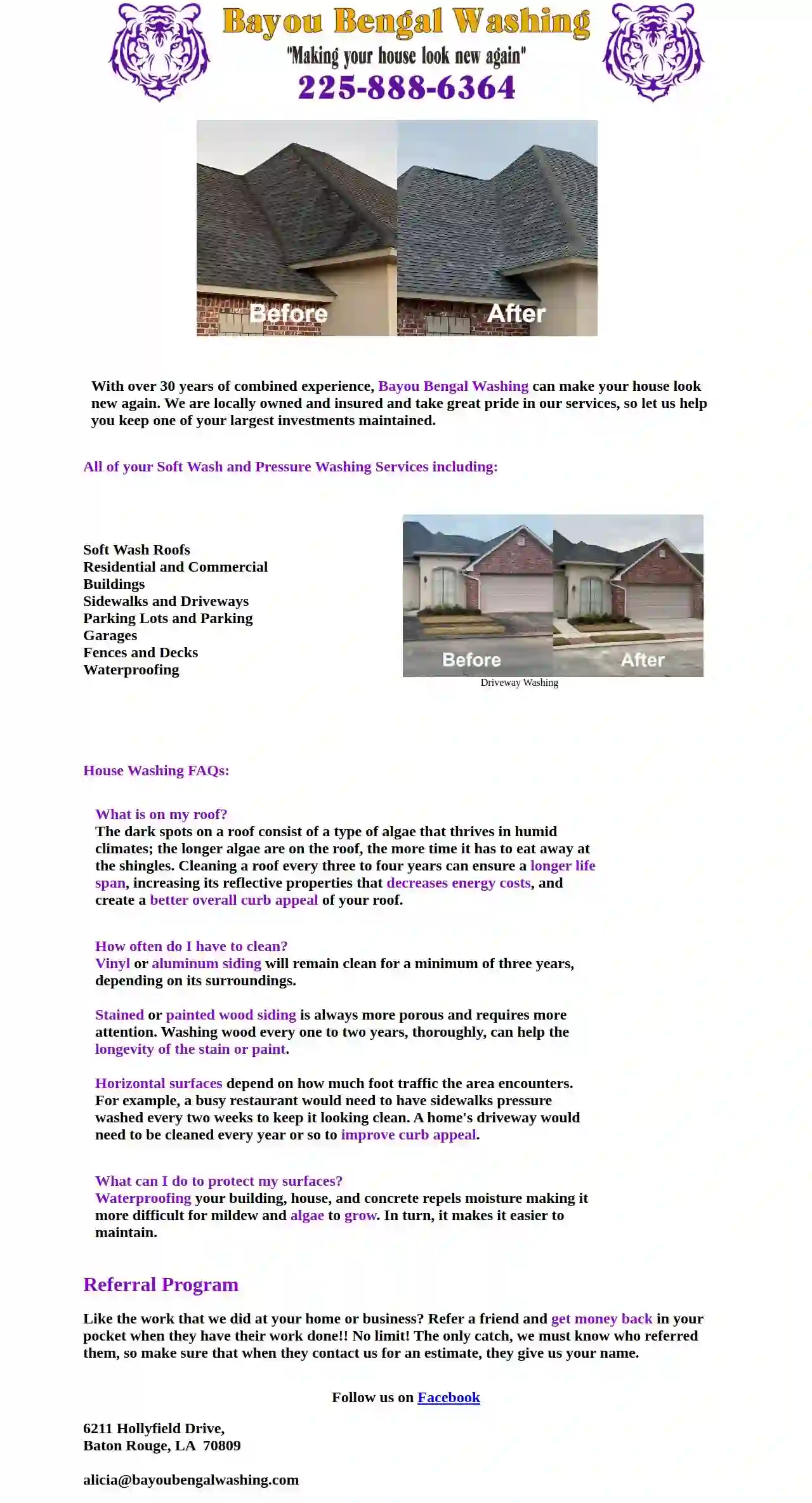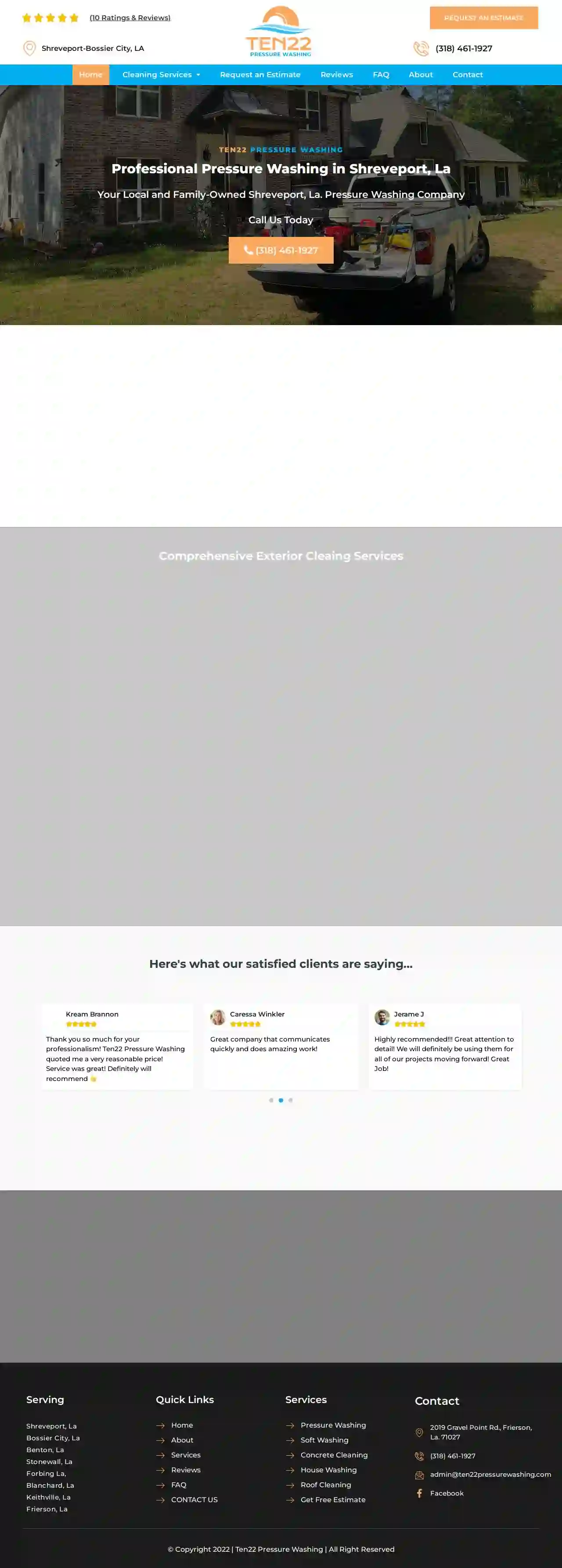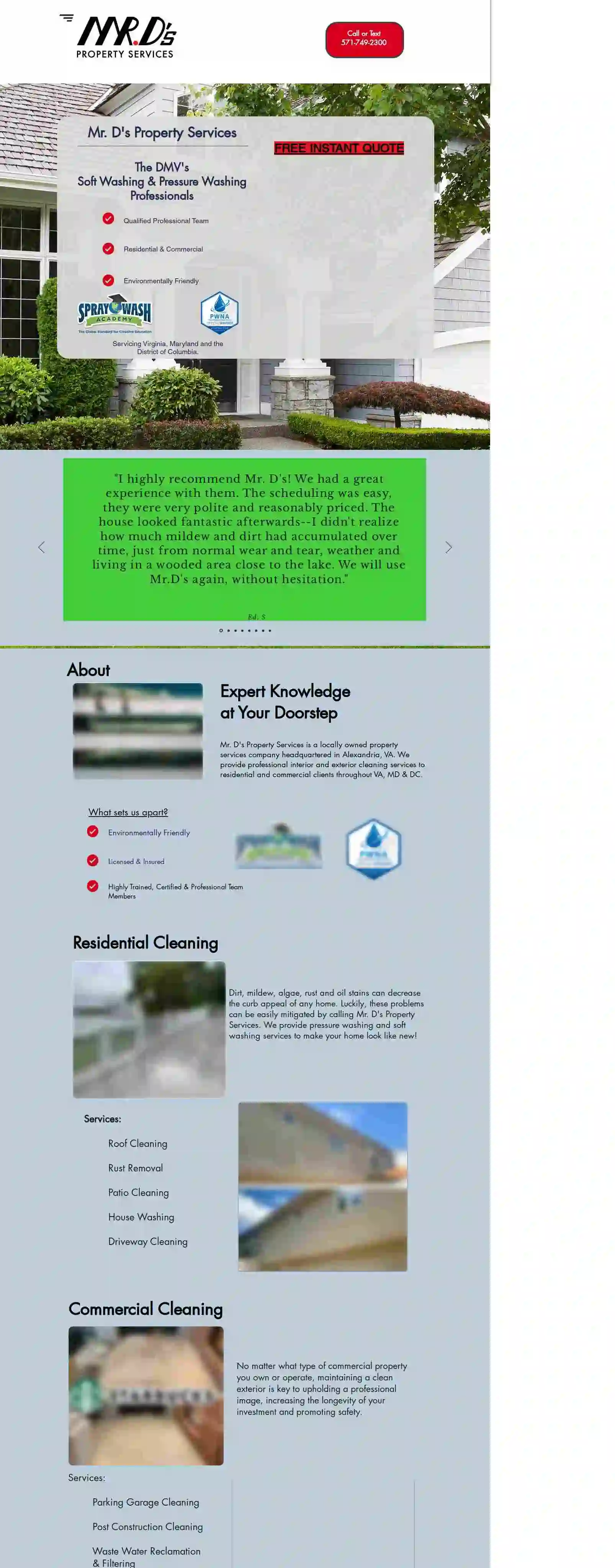Pressure Washing Youngsville
Find the best Exterior Cleaning in Youngsville
Get multiple Deck and Fence Cleaning quotes for your project today! Compare profiles, reviews, accreditations, portfolio, etc... and choose the best offer.

Bright Choice Pressure Washing
517 reviewsAlexandria, VA, 22301, USBright Choice Pressure Washing is a professional and licensed company serving the Alexandria, Virginia, and surrounding areas. We specialize in both commercial and residential pressure washing services, committed to delivering high-quality workmanship and exceptional customer service. Our team of highly trained and experienced technicians utilizes safe and effective cleaning methods, including soft washing, to remove dirt, grime, algae, mold, and more from various surfaces. We prioritize customer satisfaction and strive to exceed expectations with every project. Our services are backed by $2 million liability insurance, ensuring peace of mind for our clients. We proudly serve a wide range of clients, including businesses, homeowners, and property management companies.
- Services
- Why Us?
- Our Team
- Gallery
Get Quote
Top2Bottom Pressure Washing Service LLC
56 reviewsInsert address line 1 here, Insert address line 2 here, Insert street address here, Alexandria, Alexandria, LA, USTop 2 Bottom Pressure Washing is a locally owned and operated contractor offering Alexandria, LA and the surrounding communities with quality pressure and power washing services for your home or business. We are proud to offer quality exterior and fleet washing services for your home or business as well as new construction cleanup. Our courteous, knowledgeable technicians have the tools and training for all your roof, siding, driveway, and other exterior cleaning needs. We work directly with each client to understand your cleaning needs and budget. Whether you're looking for a small, one-time project, or full cleaning services on a recurring schedule, we can offer the services you need at prices you can afford.
- Services
- Why Us?
- Accreditations
- Our Team
- Gallery
Get Quote
ProClean Services
4.9129 reviewsNew Orleans, LA, 1830 Hermosa Street, 70114, USProClean Services is the highest-rated pressure washing company in NOLA. We are a family owned and operated company proudly serving the New Orleans and surrounding areas for over 20 years! So Trust us for all your residential and commercial cleaning needs! ProClean Services is 100% confident that if we can’t get it Clean, no one can! I look forward in being of service to you. Our cleaning experts in New Orleans are respectful of your home and business, and truly take pride in our work. You can be sure the job will get done right the first time. As the owner and operator of a quality residential and commercial cleaning service in New Orleans, I believe in one to one service with 100% satisfaction on All of our work with special focus on the importance of customer satisfaction. We offer a wide selection of cleaning and damage prevention services and offer free on-site or telephone estimates for all of New Orleans and surrounding areas cleaning needs.
- Services
- Why Us?
- Accreditations
- Our Team
- Testimonials
- Gallery
Get Quote
GulfSouth Pressure Pros LLC
5130 reviewsNew Orleans, USRevitalize Your Space with GulfSouth Pressure Pros. Get An Estimate or Call us: +15048677100. GulfSouth Pressure Pros LLC is a professional pressure washing company serving New Orleans, LA, and surrounding areas. We offer a wide range of services including House Washing, Roof Washing, Concrete Washing, Deck & Fence Washing, Gutter Cleaning, and Commercial pressure washing. Our team of experts uses the latest equipment and techniques to deliver superior results. With over 10+ years of experience, we have built a reputation for excellence and customer satisfaction. Contact us today to schedule your appointment and experience the GulfSouth Pressure Pros difference.
- Services
- Why Us?
- Testimonials
- Gallery
Get Quote
Neptune ProWash
546 reviewsLuling, LA, USTransform Your Space With Our Expert Services Welcome to Neptune ProWash, where we specialize in rejuvenating residential and commercial properties. Our range of services, including holiday lighting, soft washing, pressure washing, roof washing, gutter cleaning, and concrete cleaning, is designed to enhance the beauty and value of your property. Discover our commitment to quality and customer satisfaction. Leading Pressure Washing Services in Luling, LA, and the Greater New Orleans Area At Neptune ProWash, located in the heart of Luling, LA, and serving the Greater New Orleans area, we are passionate about serving our community. Since 2018, our team has been dedicated to delivering pressure washing services that surpass expectations. We’re not just about pressure washing; we embrace a holistic approach to maintaining your property’s exterior. From holiday lighting, soft washing, pressure washing, roof washing, gutter cleaning, to concrete cleaning, our trained staff uses both traditional and innovative techniques for optimal results. As a local business, we are deeply rooted in the community, ensuring that each project reflects our commitment to enhancing the beauty and value of your property with our professional pressure washing services. Work With Us (504) 452-2455 [email protected] Luling, LA Why Choose Us? Experience Unmatched Service With Us Choosing Neptune ProWash means more than just getting a service; it’s about experiencing the dedication and expertise that sets us apart. Our team, with 6 years of experience, is trained in the latest techniques to ensure safe and effective cleaning. We understand the unique challenges of maintaining properties in Southern Louisiana and tailor our services to meet these needs. We ensure that your residential or commercial property always looks its best. With us, you’re not just hiring a contractor; you’re partnering with a team that values your property as much as you do. Expert Experience Guaranteed! Uncover a World of Superior Cleaning Services Neptune ProWash offers a diverse array of services to meet all your exterior cleaning needs. Our holiday lighting service provides hands-off, custom-designed lighting installations, ensuring your property shines bright during the festive season. For delicate surfaces, our soft washing technique is perfect, gently removing dirt without damage. Pressure washing is our forte, rejuvenating various surfaces from patios to pool decks with precision. Our roof washing service transforms your roof, making it look brand new, while our gutter cleaning ensures your gutters are free from debris and functioning optimally. Lastly, our concrete cleaning service revitalizes sidewalks, driveways, and commercial spaces, enhancing their appearance and safety. Choose Us for Exceptional Cleaning Services Trust Neptune ProWash for reliable and effective cleaning solutions. We’re committed to excellence in every project, ensuring your satisfaction. Explore our services to see how we can transform your property. Read to learn more!
- Services
- Why Us?
- Gallery
Get Quote
LA Pressure Washing Pros
5122 reviews7724 Settlers Circle, Baton Rouge, 70810, USLA Pressure Wash Pros is a Baton Rouge-based pressure washing company dedicated to providing top-notch residential and commercial cleaning services. We understand that your home is your sanctuary and strive to help you maintain its beauty and cleanliness. Our team of experienced, licensed, and insured professionals offers a wide range range of pressure washing services, including driveway cleaning, sidewalk cleaning, house washing, roof cleaning, parking lot washing, storefront cleaning, and more. We pride ourselves on our promptness, efficiency, and commitment to treating every client like family. We offer free estimates so you can know the cost upfront. We guarantee our work and are dedicated to exceeding your expectations.
- Services
- Why Us?
- Accreditations
- Our Team
- Testimonials
- Gallery
Get Quote
Bayou Bengal Washing
52 reviews6211 Hollyfield Drive, Baton Rouge, 70809, USWith over 30 years of combined experience, Bayou Bengal Washing can make your house look new again. We are locally owned and insured and take great pride in our services, so let us help you keep one of your largest investments maintained. All of your Soft Wash and Pressure Washing Services including: Soft Wash Roofs Residential and Commercial Buildings Sidewalks and Driveways Parking Lots and Parking Garages Fences and Decks Waterproofing Driveway Washing Sidewalk Washing Driveway Washing Walkway Washing Patio Washing Patio Washing House Washing FAQs: What is on my roof? The dark spots on a roof consist of a type of algae that thrives in humid climates; the longer algae are on the roof, the more time it has to eat away at the shingles. Cleaning a roof every three to four years can ensure a longer life span, increasing its reflective properties that decreases energy costs, and create a better overall curb appeal of your roof. How often do I have to clean? Vinyl or aluminum siding will remain clean for a minimum of three years, depending on its surroundings. Stained or painted wood siding is always more porous and requires more attention. Washing wood every one to two years, thoroughly, can help the longevity of the stain or paint. Horizontal surfaces depend on how much foot traffic the area encounters. For example, a busy restaurant would need to have sidewalks pressure washed every two weeks to keep it looking clean. A home's driveway would need to be cleaned every year or so to improve curb appeal. What can I do to protect my surfaces? Waterproofing your building, house, and concrete repels moisture making it more difficult for mildew and algae to grow. In turn, it makes it easier to maintain. Referral Program Like the work that we did at your home or business? Refer a friend and get money back in your pocket when they have their work done!! No limit! The only catch, we must know who referred them, so make sure that when they contact us for an estimate, they give us your name. Follow us on Facebook 6211 Hollyfield Drive, Baton Rouge, LA 70809 [email protected]
- Services
- Why Us?
- Our Team
- Gallery
Get Quote
Rhino Blast Exterior Cleaning, LLC
4.944 reviewsCovington, 70433, USRhino Blast Exterior Cleaning is a locally owned and family operated exterior cleaning company serving residential, commercial, and multi-unit customers throughout Southeast Louisiana and surrounding areas. We offer a variety of exterior cleaning packages designed to meet our customers' needs, budget, and timelines. We are committed to providing our customers with personalized experiences through superior customer service and excellent quality work. Why Choose the Rhino: Personalized Experiences, Professionalism, Superior customer service, Free estimates, Prompt scheduling, Attention to detail, Experienced technicians, State of the art cleaning equipment, Uniformed technicians.
- Services
- Why Us?
- Gallery
Get Quote
Ten22 Pressure Washing
512 reviews2019 Gravel Point Rd., Frierson, 71027, USTEN22 Pressure Washing is a locally and family-owned pressure washing company serving Shreveport, La, Bossier City, La, Benton, La, Stonewall, La, Forbing La, Blanchard, La, Keithville, La, and Frierson, La. We offer a full line of commercial and residential services, including pressure washing, soft washing, concrete cleaning, house washing, and roof cleaning. Our team is dedicated to providing safe and effective cleaning methods, with same-day quotes and free estimates. We pride ourselves on our attention to detail and commitment to customer satisfaction.
- Services
- Why Us?
- Testimonials
- Gallery
Get Quote
Mr. D's Property Services - Professional Power Washing
510 reviews123 Main St, Suite 100, Alexandria, 22314, USMr. D's Property Services is a locally owned property services company headquartered in Alexandria, VA. We provide professional interior and exterior cleaning services to residential and commercial clients throughout VA, MD & DC. Our services include roof cleaning, rust removal, patio cleaning, house washing, and driveway cleaning for residential properties, and parking garage cleaning, post construction cleaning, waste water reclamation & filtering, restaurant cleaning, and sidewalk/entry way cleaning for commercial properties. We are environmentally friendly, licensed, and insured, with a highly trained, certified, and professional team.
- Services
- Why Us?
- Accreditations
- Our Team
- Testimonials
- Gallery
Get Quote
Over 60,241+ Janitorial Contractors registered
Our cleaning companies operate in Youngsville & beyond!
CleaningMatch has curated and vetted the Best Cleaning Businesses arround Youngsville. Find a trustworthy contractor today.
Frequently Asked Questions About Pressure Washing
- Experience and Expertise: Professionals have the knowledge and skills to choose the right pressure levels and cleaning solutions for different surfaces, minimizing the risk of damage.
- Professional Equipment: Pressure washing companies use commercial-grade equipment that is more powerful and efficient than consumer-grade pressure washers.
- Safety: Pressure washing can be hazardous, especially when working on ladders or with high-pressure water. Professionals are trained in safety procedures and have the necessary equipment to work safely.
- Time-Saving: Pressure washing can be time-consuming, especially for larger projects. Hiring professionals frees up your time for other tasks.
- Experience: 'How long have you been in business, and what types of pressure washing projects do you specialize in?'
- Licensing and Insurance: 'Are you licensed, insured, and bonded? Can I see proof of coverage?'
- Equipment and Techniques: 'What type of pressure washer do you use? What cleaning solutions do you use, and are they safe for my surfaces?'
- Safety Precautions: 'What safety precautions do you take during pressure washing?'
- Surface Preparation: 'Will you need to move any furniture or objects before pressure washing?'
- Water Usage: 'Do you use a water reclamation system or other methods to conserve water?'
- Cleanup: 'How do you handle cleanup after pressure washing?'
- Guarantees: 'Do you offer a satisfaction guarantee?'
- References: 'Can you provide references from previous clients?'
- Regular Cleaning: Sweep or rinse surfaces regularly to prevent dirt and grime from building up.
- Address Stains Promptly: Clean up spills or stains as soon as possible to prevent them from setting in.
- Trim Vegetation: Keep trees and shrubs trimmed away from surfaces to minimize shade, which can promote mold and mildew growth.
- Apply Protective Coatings: Consider applying protective sealants or coatings to surfaces like decks or fences to repel water and dirt, extending their lifespan and maintaining their appearance.
- Schedule Periodic Pressure Washing: Schedule periodic professional pressure washing to maintain the cleanliness and appearance of your surfaces over time.
- Soft Washing: Soft washing is generally recommended for wood decks as it uses lower pressure and specialized cleaning solutions to safely remove dirt, mildew, and algae without causing damage.
- Lower Pressure Setting: If using a pressure washer on a wood deck, use a lower pressure setting (around 1500 PSI) and a wide-angle nozzle (25-40 degrees).
- Maintain Distance: Hold the nozzle at least 12 inches away from the deck surface to prevent etching or splintering.
- Professional Pressure Washing: If you're unsure about pressure washing your deck safely, hire a professional pressure washing company with experience in cleaning wood surfaces.
Can I pressure wash my own house?
If you're considering DIY pressure washing, assess the complexity of the project, your experience, and the risks involved. For larger or more challenging projects, hiring professionals is often a wiser and safer choice.
What questions should I ask a pressure washing contractor before hiring them?
By asking these questions, you can gather valuable information and choose a pressure washing contractor that meets your requirements.
What are some tips for maintaining my pressure washed surfaces?
By implementing these maintenance practices, you can prolong the results of your pressure washing and keep your surfaces looking their best.
Can pressure washing damage my deck?
By using the right cleaning method and precautions, you can effectively clean your wood deck without causing damage and prolong its lifespan.
Can I pressure wash my own house?
- Experience and Expertise: Professionals have the knowledge and skills to choose the right pressure levels and cleaning solutions for different surfaces, minimizing the risk of damage.
- Professional Equipment: Pressure washing companies use commercial-grade equipment that is more powerful and efficient than consumer-grade pressure washers.
- Safety: Pressure washing can be hazardous, especially when working on ladders or with high-pressure water. Professionals are trained in safety procedures and have the necessary equipment to work safely.
- Time-Saving: Pressure washing can be time-consuming, especially for larger projects. Hiring professionals frees up your time for other tasks.
If you're considering DIY pressure washing, assess the complexity of the project, your experience, and the risks involved. For larger or more challenging projects, hiring professionals is often a wiser and safer choice.
What questions should I ask a pressure washing contractor before hiring them?
- Experience: 'How long have you been in business, and what types of pressure washing projects do you specialize in?'
- Licensing and Insurance: 'Are you licensed, insured, and bonded? Can I see proof of coverage?'
- Equipment and Techniques: 'What type of pressure washer do you use? What cleaning solutions do you use, and are they safe for my surfaces?'
- Safety Precautions: 'What safety precautions do you take during pressure washing?'
- Surface Preparation: 'Will you need to move any furniture or objects before pressure washing?'
- Water Usage: 'Do you use a water reclamation system or other methods to conserve water?'
- Cleanup: 'How do you handle cleanup after pressure washing?'
- Guarantees: 'Do you offer a satisfaction guarantee?'
- References: 'Can you provide references from previous clients?'
By asking these questions, you can gather valuable information and choose a pressure washing contractor that meets your requirements.
What are some tips for maintaining my pressure washed surfaces?
- Regular Cleaning: Sweep or rinse surfaces regularly to prevent dirt and grime from building up.
- Address Stains Promptly: Clean up spills or stains as soon as possible to prevent them from setting in.
- Trim Vegetation: Keep trees and shrubs trimmed away from surfaces to minimize shade, which can promote mold and mildew growth.
- Apply Protective Coatings: Consider applying protective sealants or coatings to surfaces like decks or fences to repel water and dirt, extending their lifespan and maintaining their appearance.
- Schedule Periodic Pressure Washing: Schedule periodic professional pressure washing to maintain the cleanliness and appearance of your surfaces over time.
By implementing these maintenance practices, you can prolong the results of your pressure washing and keep your surfaces looking their best.
Can pressure washing damage my deck?
- Soft Washing: Soft washing is generally recommended for wood decks as it uses lower pressure and specialized cleaning solutions to safely remove dirt, mildew, and algae without causing damage.
- Lower Pressure Setting: If using a pressure washer on a wood deck, use a lower pressure setting (around 1500 PSI) and a wide-angle nozzle (25-40 degrees).
- Maintain Distance: Hold the nozzle at least 12 inches away from the deck surface to prevent etching or splintering.
- Professional Pressure Washing: If you're unsure about pressure washing your deck safely, hire a professional pressure washing company with experience in cleaning wood surfaces.
By using the right cleaning method and precautions, you can effectively clean your wood deck without causing damage and prolong its lifespan.